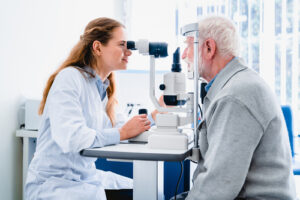
Does your vision seem blurry? Are you struggling to see what’s right in front of you?
It can be hard to keep up with regular visits to see your doctor, but it’s important to see doctors regularly to ensure you’re healthy. Just like you should have a yearly physical with your primary care physician and dentist, you must see your eye doctor regularly for a routine eye exam.
If you haven’t had a comprehensive eye exam in several years, it’s time to get on top of your eye health. Why not take the time to set up an appointment with your eye doctor?
If you don’t have an eye doctor, there’s never been a better time to find one to start making your eyes and your vision a priority.
You may not need to see your eye doctor every year. How often you should have eye exams depends on certain factors.
These include your age, health, and other reasons. Keep reading to learn why eye exams are crucial to your health and when to schedule your next one!
The Importance of Eye Exams

Seeing your primary care physician for physicals helps ensure you’re in good health and is the best way to detect any health problems. The same goes for eye exams with your eye doctor at St. Luke’s at The Villages.
Many eye conditions can go unnoticed because they don’t present symptoms early on. When these eye conditions become noticeable, it’s usually at the cost of your vision.
The damage is often irreversible, leading to permanent loss of vision. Comprehensive eye exams are the one surefire way to catch these issues early.
Your eye doctor can spot the earliest signs of eye conditions by examining your eyes thoroughly. They’ll usually dilate your pupils so they can see through the pupils to the interior of your eye.
Your ophthalmologist can also use special imaging equipment to take detailed pictures of your eye and look for indications of disease. By spotting these signs, your eye doctor can diagnose you with the earliest possible signs of an eye condition and recommend treatment while it’s still viable, possibly saving your vision.
Regular eye exams are even more critical if you’ve already been diagnosed with an eye condition. If you have a refractive error, you should have eye exams more frequently than patients who don’t depend on visual aids like glasses or contact lenses. But even those with healthy eyes still need eye exams as they age.
How Often Should You Have Eye Exams?
How often you should schedule eye exams at St. Luke’s at The Villages depends on several factors. But one of the most significant of these is age.
The other to keep in mind is if you have a refractive error. If you have a refractive error, this will significantly affect how often you should schedule eye exams with your eye doctor.
If You Have a Refractive Error

You need an eye exam every year if you’re nearsighted, farsighted, or have astigmatism. An annual eye exam ensures your prescription for glasses or contact lenses is up-to-date.
It also allows your ophthalmologist to monitor how healthy your eyes are. A refractive error, especially a stronger prescription, may increase your risk of developing other eye conditions as you continue aging.
If You’re Under 18
Children and teenagers under 18 should have an eye exam every year, starting around age 5. Many eye conditions develop in childhood, so monitoring how healthy your children’s eyes are as they grow up is essential.
If You’re 18-39

An eye exam every year isn’t needed for adults between 18 and 40 who don’t have a refractive error or other eye conditions. However, you should have your eyes checked every two to three years.
If you notice any vision changes, see your eye doctor as soon as possible. These could be signs of an eye condition or another health problem, making it necessary to determine the root cause and receive treatment if it applies.
If You’re 40-59
All adults between 40 and 60 should have their eyes examined every two years. Depending on your eye health and risk for eye disease, you may need an eye exam more frequently before you turn 60. If you’re unsure how often to see your eye doctor, talk to your ophthalmologist about setting up the best schedule.
If You’re 60+

If you’re 60 or older, you should see your eye doctor annually. As you get older, your risk of developing eye conditions increases substantially.
This fact is still valid even if you’re in good health otherwise. Being over 60 puts you at high risk for several eye conditions like age-related macular degeneration and glaucoma, so it’s crucial to have frequent eye exams.
Eye Disease Risk Factors
Remember that the above recommendations are general suggestions based on age. You may need eye exams more frequently if you’re at an increased risk for certain eye diseases.
Here are a few of the factors that may put you at higher risk for eye disease:

- Diabetes
- Heart disease
- High blood pressure
- Tobacco use
- Excessive alcohol consumption
- Ethnicity
- People of African, Hispanic, Asian, and Native American descent are at higher risk for glaucoma
- If you’re Caucasian, you’re at an increased risk for developing age-related macular degeneration
- Over-exposure to UV rays
- Being very nearsighted or very farsighted
- A family history of eye disease
If you only exhibit one or two of these factors, you may not necessarily need eye exams more frequently. But if you exhibit several, you may be at a more elevated risk of developing eye diseases.
Talk to your eye doctor and ask for their recommendation to know how often you need an eye exam. They’ll be able to assess your risk based on your current eye health and medical history to determine just how regularly you need your eyes examined.
Is it time to schedule your next eye exam? Request an appointment at St. Luke’s at The Villages in Lake Sumter Landing, FL, now!









